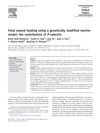 53 citations,
June 2012 in “Annales d'Endocrinologie”
53 citations,
June 2012 in “Annales d'Endocrinologie” The document concludes that recognizing and properly diagnosing lipodystrophy syndromes is crucial for effective management and treatment.
 1 citations,
January 2022 in “Wiadomości Lekarskie”
1 citations,
January 2022 in “Wiadomości Lekarskie” GERD symptoms are linked to acid exposure time and daytime sleepiness, influenced by ghrelin levels.
 86 citations,
January 2019 in “Frontiers in Immunology”
86 citations,
January 2019 in “Frontiers in Immunology” The document concludes that diagnosing and treating Human African Trypanosomiasis is challenging, but new treatments like fexinidazole are promising.
 23 citations,
June 2017 in “Rejuvenation Research”
23 citations,
June 2017 in “Rejuvenation Research” Minoxidil treatment increases aorta elasticity and reduces stiffness in aged mice, potentially helping with age-related heart issues.
 23 citations,
January 2015 in “Journal of The American Academy of Dermatology”
23 citations,
January 2015 in “Journal of The American Academy of Dermatology” People with myotonic dystrophy type 1 have a higher chance of getting skin tumors, including melanoma.
 12 citations,
January 2013 in “Alcohol and Alcoholism”
12 citations,
January 2013 in “Alcohol and Alcoholism” Alcohol in teen years leads to more adult drinking, finasteride doesn't help.
 1 citations,
November 2015 in “Indian Journal of Clinical Biochemistry”
1 citations,
November 2015 in “Indian Journal of Clinical Biochemistry” The conference presented findings on how vitamin D levels, genetic factors, and lifestyle choices like smoking and yoga affect various health conditions and diseases.
 June 2008 in “CRC Press eBooks”
June 2008 in “CRC Press eBooks” PCOS may have evolved as an advantage in past environments with food scarcity.
 3 citations,
May 2023 in “Biomedicines”
3 citations,
May 2023 in “Biomedicines” PCOS causes infertility mainly due to hormonal imbalances, insulin resistance, and chronic inflammation.
1 citations,
January 2018 in “Advances in cancer prevention” Preventing cancer involves lifestyle changes, vaccinations, early screening, and understanding cancer's molecular basis.
128 citations,
December 2006 in “Journal of Biological Chemistry” Altering SSAT affects fat metabolism and body fat in mice.
107 citations,
June 1997 in “PubMed” EGFR is essential for normal hair development and follicle differentiation.
 36 citations,
August 2011 in “Journal of Controlled Release”
36 citations,
August 2011 in “Journal of Controlled Release” Genetically-altered adult stem cells can help in wound healing and are becoming crucial in regenerative medicine and drug design.
22 citations,
July 2016 in “Cellular and Molecular Life Sciences” Genetic changes in mice help understand skin and hair disorders, aiding treatment development for acne and hair loss.
17 citations,
May 2020 in “Forensic Science International Genetics” Genetically variant peptides are reliable for forensic identification despite age-related changes in hair proteins.
 13 citations,
December 2014 in “Stem Cells”
13 citations,
December 2014 in “Stem Cells” Hair and skin can regenerate without bulge stem cells due to other compensating cells.
 10 citations,
April 2008 in “Journal of Pediatric Surgery”
10 citations,
April 2008 in “Journal of Pediatric Surgery” P-selectin is not the only factor that prevents scarring in fetal wound healing in mice.
5 citations,
April 2017 in “The journal of investigative dermatology/Journal of investigative dermatology” The gene therapy showed significant wound healing and was safe for treating severe RDEB.
 3 citations,
June 2006 in “Expert Review of Dermatology”
3 citations,
June 2006 in “Expert Review of Dermatology” The document concludes that hair loss is complex, affects many people, has limited treatments, and requires more research on its causes and psychological impact.
 2 citations,
May 2021 in “Journal of the Endocrine Society”
2 citations,
May 2021 in “Journal of the Endocrine Society” Men with high genetic risk for Polycystic Ovary Syndrome (PCOS) have increased chances of obesity, type 2 diabetes, heart disease, and hair loss, showing PCOS risk factors can affect both genders.
 25 citations,
August 2007 in “Molecular Therapy”
25 citations,
August 2007 in “Molecular Therapy” Researchers found a safe and effective way to pick genetically modified skin cells with high growth potential using CD24.
 4 citations,
January 2023 in “Frontiers in Immunology”
4 citations,
January 2023 in “Frontiers in Immunology” Shorter telomeres in white blood cells may increase the risk of a common type of hair loss.
 1 citations,
October 2023 in “Frontiers in endocrinology”
1 citations,
October 2023 in “Frontiers in endocrinology” Regulating certain sex hormones may help delay facial aging.
 May 2024 in “Skin research and technology”
May 2024 in “Skin research and technology” Certain metabolites can either protect against or increase the risk of hair loss.
 87 citations,
July 2018 in “Biochimica et Biophysica Acta (BBA) - Molecular Cell Research”
87 citations,
July 2018 in “Biochimica et Biophysica Acta (BBA) - Molecular Cell Research” Mice studies show that Protein Phosphatase 2A is crucial for cell growth, development, and disease prevention.

Higher free testosterone levels can increase bone density and decrease body fat but may raise the risk of prostate cancer, hair loss, and benign prostate enlargement.
 1 citations,
December 2020 in “Acta dermato-venereologica”
1 citations,
December 2020 in “Acta dermato-venereologica” Some scalp sores are linked to different inherited skin conditions.
 1 citations,
January 2008 in “Proceedings of the 9th World Rabbit Congress, Verona, Italy, 10-13 June 2008”
1 citations,
January 2008 in “Proceedings of the 9th World Rabbit Congress, Verona, Italy, 10-13 June 2008” Furless male rabbits grew slightly faster and heavier than furred ones, but testosterone levels were not the cause.
April 2017 in “The journal of investigative dermatology/Journal of investigative dermatology” Researchers developed a method to grow human hair follicles using 3D-printed skin models and modified cells.
28 citations,
August 2013 in “Hypertension” Potassium channel openers help form elastic fibers in arteries and can treat elastin deficiency and hypertension.






















